Press and News Scaling CGIAR innovation in Africa: Forging new collaborations for greater impact beyond COP28
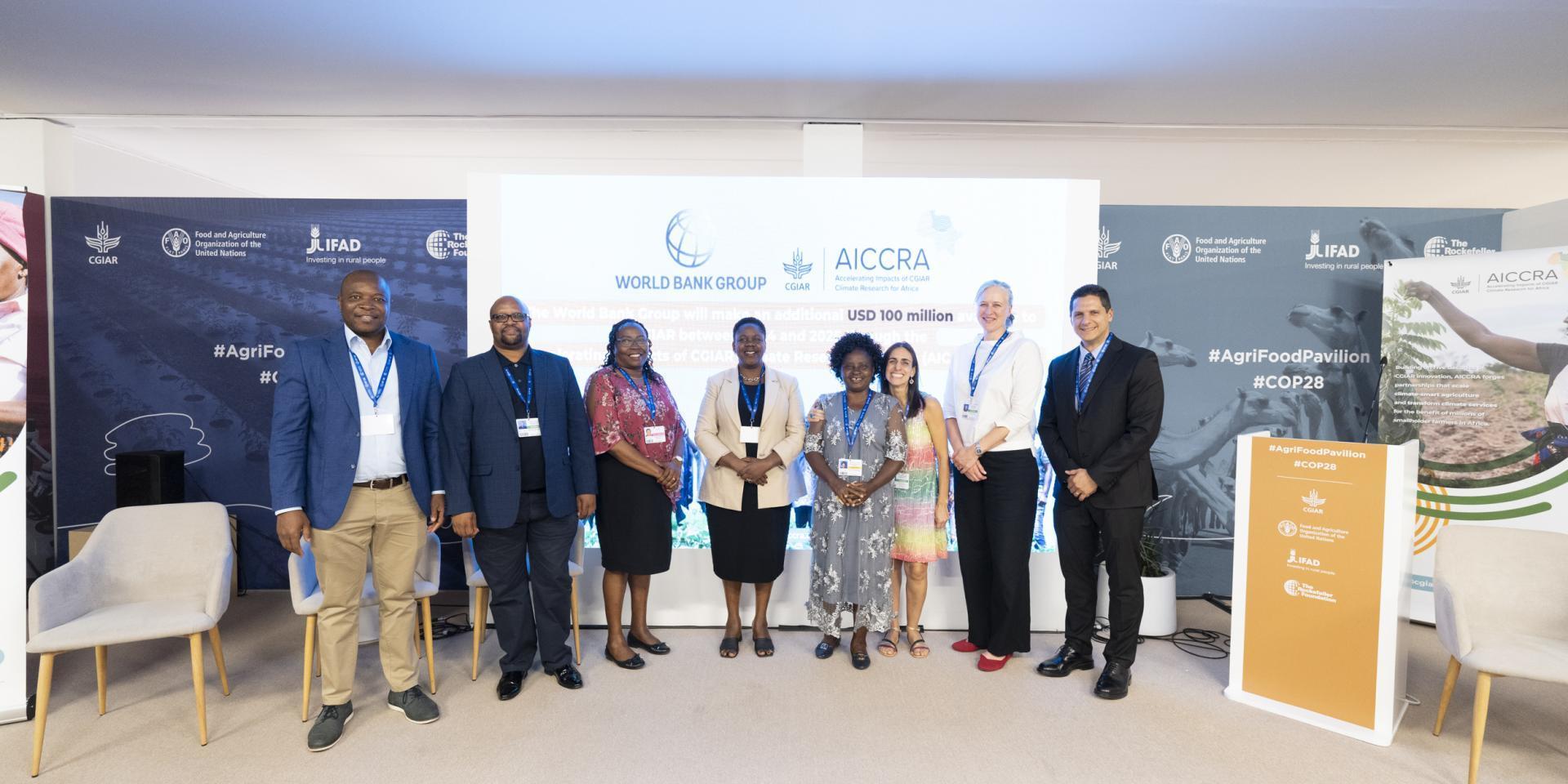
By Ana Maria Loboguerrero and Rhys Bucknall-Williams
CGIAR has played a critical role in global agricultural development for decades, promoting food security and raising living standards for smallholder farmers. In Africa, national and regional partners can and must play a critical role in delivering CGIAR-led innovations at scale. So at COP28, AICCRA hosted a debate on the future of CGIAR partnerships in Africa, just as the World Bank Group announced it is committing $100 million in additional finance to AICCRA, CGIAR’s program to accelerate climate impact in Africa, led by the Alliance of Bioversity International and CIAT.
CGIAR is the world’s largest publicly funded research partnership for agriculture and food security and has played a critical role in global agricultural development for more than five decades.
Thanks to innovations developed by CGIAR scientists and researchers, we have seen improved livelihoods for millions of smallholder farmers, with more robust food security for many communities in developing countries.
An external assessment of CGIAR found in 2020 that there had been a 10-dollar return on every dollar invested in CGIAR research and development over the past 50 years.
But over time, and as the world faces ever more complex challenges like climate change, the incremental gains from such innovation naturally become harder to maintain, especially in challenging contexts across Sub-Saharan Africa.
Driving innovation is not enough. If the CGIAR wants to achieve its goal of transforming food, land, and water systems in a climate crisis, then more must be done to deliver its innovations on the scale needed to meet the challenges of today and the future.
That’s why the World Bank Group committed USD 60 million in 2020 through its International Development Association (IDA) to CGIAR, to strengthen the capacity of African governments, regional organizations, farmers and other stakeholders to expand access to climate information services and validated climate-smart agriculture technologies that have been developed by CGIAR.
This support launched the Accelerating Impacts of CGIAR Climate Research for Africa (AICCRA) project, a unique format for CGIAR to forge new collaborations with its partners in Africa to ‘connect-the-dots' between science, policy, and action.
Partnerships developed and strengthened through AICCRA's activities are accelerating action to get CGIAR innovations off shelves, out of labs and into the hands of smallholder farmers. AICCRA is set to have reached five million people by the end of 2023, and at the recent COP28 climate summit in Dubai, the World Bank Group announced it would recommit an additional USD 100 million to AICCRA in 2024-25 to continue scaling access to and use of CGIAR-led innovations.
At this critical crossroads for the project, AICCRA hosted a debate in the Food and Agriculture Pavilion at COP28. Building on the conversation started at the inaugural Africa Climate Summit in Nairobi earlier this year, the purpose of AICCRA’s COP28 event was to collectively forge a new approach to collaboration between CGIAR research centers and African partners to accelerate and scale climate action in agriculture over the coming five years.
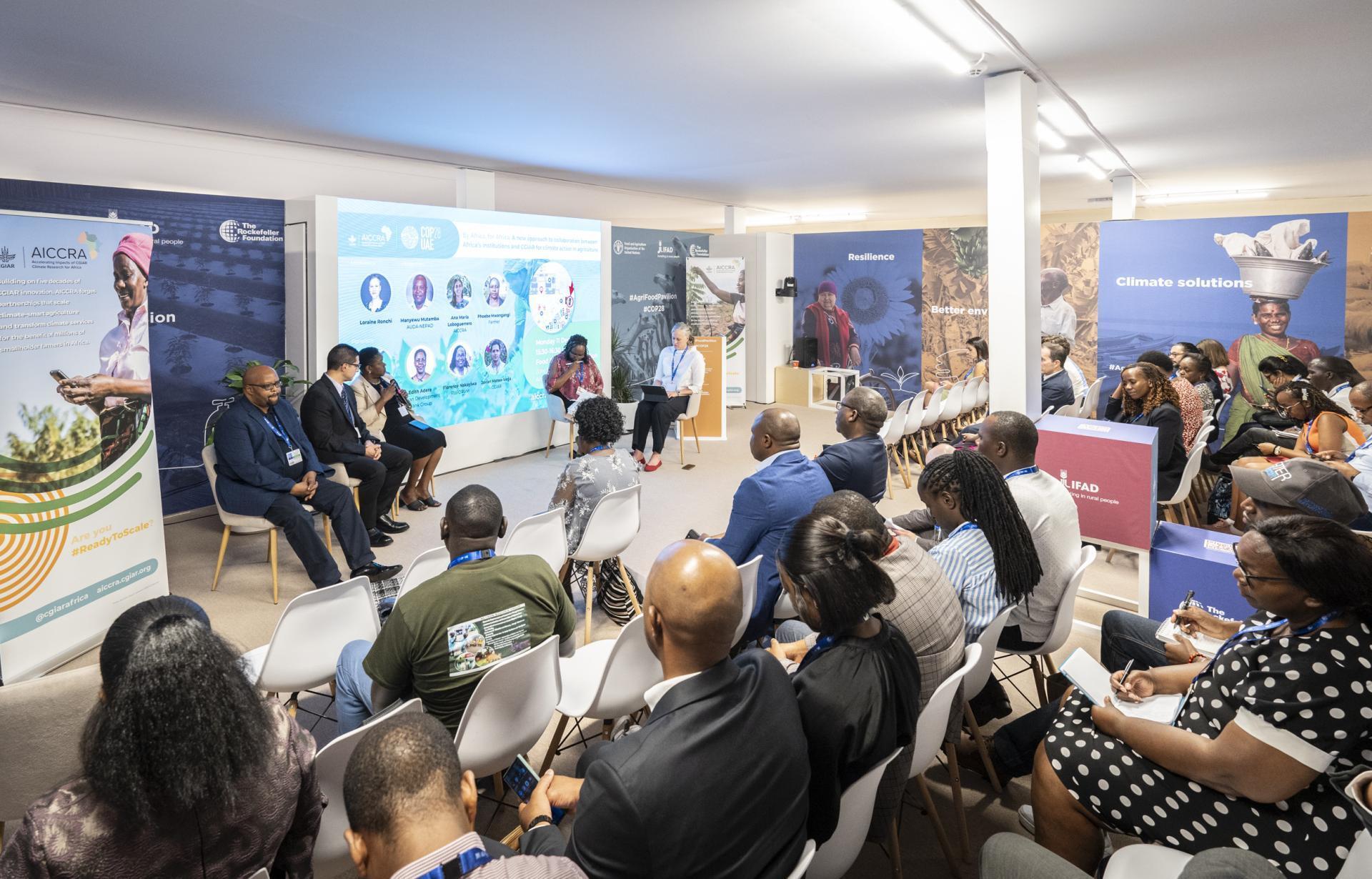
Attendees at 'By Africa, for Africa - A new approach to collaboration between Africa’s institutions and CGIAR for climate action in agriculture'
AICCRA Director Ana Maria Loboguerrero shared with the audience that had packed the pavilion event space how AICCRA partnerships in Africa have delivered impact so far, and how these partnerships will evolve over the coming years thanks to continued support from the World Bank Group.
The debate spurred by this AICCRA COP28 event, hosted by Loraine Ronchi from the World Bank Group, was timely. A new paper by Jayne et al 2023 (and reviewed by CGIAR Managing Director of Genetic Innovation Sonja Vermeulen) shows how Africa’s international development partners must undertake “serious stocktaking” to develop a greater appreciation of how their own effectiveness depends on the performance of national agriculture research institutions in Africa, and why initiatives that build their capacities must be prioritized.

Ana Maria Loboguerrero – Director, Accelerating Impacts of CGIAR Climate Research for Africa (AICCRA)
So, speakers at AICCRA’s COP28 event “By Africa, for Africa - A new approach to collaboration between Africa’s institutions and CGIAR for climate action in agriculture” were drawn from CGIAR, the World Bank Group, the African Union Development Agency - New Partnership for Africa's Development (AUDA-NEPAD), the African Development Bank Group (AfDB), the Centre for Coordination of Agricultural Research and Development for Southern Africa (CCARDESA) and the Regional Universities Forum for Capacity Building in Agriculture (RUFORUM).
Opening the event was Phoebe Mwangangi, a smallholder farmer from Makueni County, Kenya. Her authentic voice in the debate brought home the urgency and relevance of the dialogue. Ultimately, CGIAR innovations must reach and work for smallholder farmers like her. AICCRA may have reached five million, but there are many millions more to reach. Other high-level speakers joked that Phoebe was very effective at giving everyone their “marching orders”!
Watch the event
The scale of the climate challenge for African agriculture—and the ambitions of the continent’s regional efforts in tackling them—was laid out by Manyewu Mutamba (Head (Ag) of Agriculture, Food Systems and Rural Transformation at AUDA-NEPAD). In his opening keynote speech, Manyewu noted how:
“We are at a pivotal moment when it comes to climate-smart agriculture, and we’ve communicated this very clearly with our partners, [with] AICCRA specifically given the critical role they play within our programs with respect to supporting the reorientation of our programming—in relaunching of our climate-smart agriculture programs.”
Manyewu was referencing a recent briefing paper published jointly by AUDA-NEPAD and AICCRA on ‘Scaling Climate-Smart Agriculture for accelerated agri-food systems transformation in Africa’. He added that:
“We are at the point where we really feel we need to take a deep look at ourselves, our performance, where we are coming from. It is very clear that there has been meaningful progress, many good things. But as a continental institution, we are not satisfied with small gains, we want big gains, we are very ambitious. We need to make that next big step.”

Manyewu Mutamba – Head (Ag) of Agriculture, Food Systems and Rural Transformation, AUDA-NEPAD
On the event panel, Florence Nakayiwa (Deputy Executive Secretary at RUFORUM) was asked—in her view—whether global partners like CGIAR had delivered science and innovation on the scale needed to reach her ambitions in climate action. Her answer was telling:
“It’s a yes and no response. We’ve had technologies, we’ve had practices.... But we may not have reached the level of these technologies of reaching where they are supposed to be.... We need to have them on the ground.”
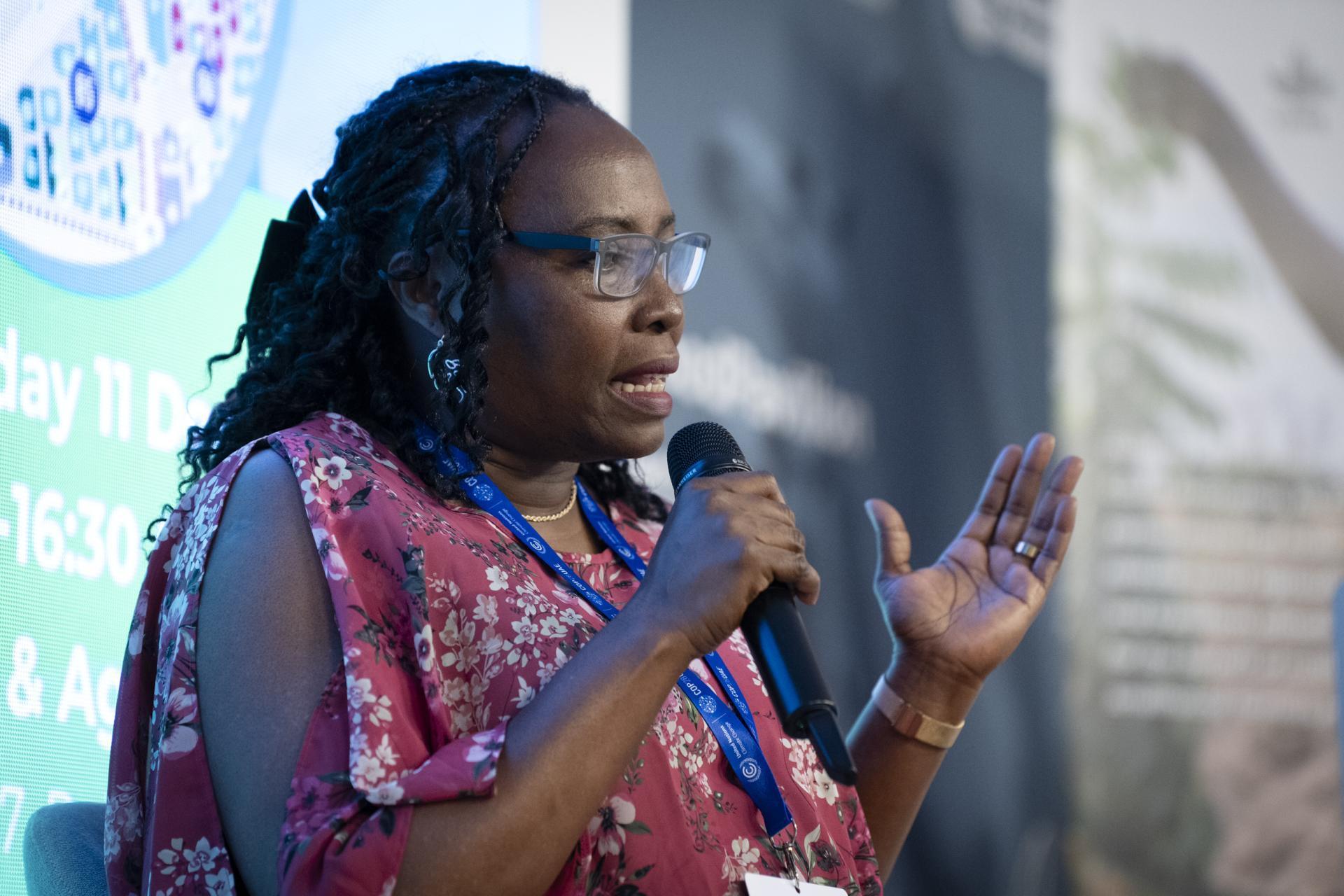
Florence Nakayiwa - Deputy Executive Secretary at the Regional Universities Forum for Capacity Building in Agriculture (RUFORUM)
Building on the comments from Florence, Edith Adera (Lead Coordinator, Africa Adaptation Acceleration Program and Regional Principal Officer at AfDB) stated that:
“Indeed, the CG[IAR] system is known in terms of excellence - of producing the technologies that we need. But having the technologies in the hands of farmers, I think that has been a challenge. I think AICCRA....is trying to change and shift that through partnerships. And partnerships are absolutely critical.”
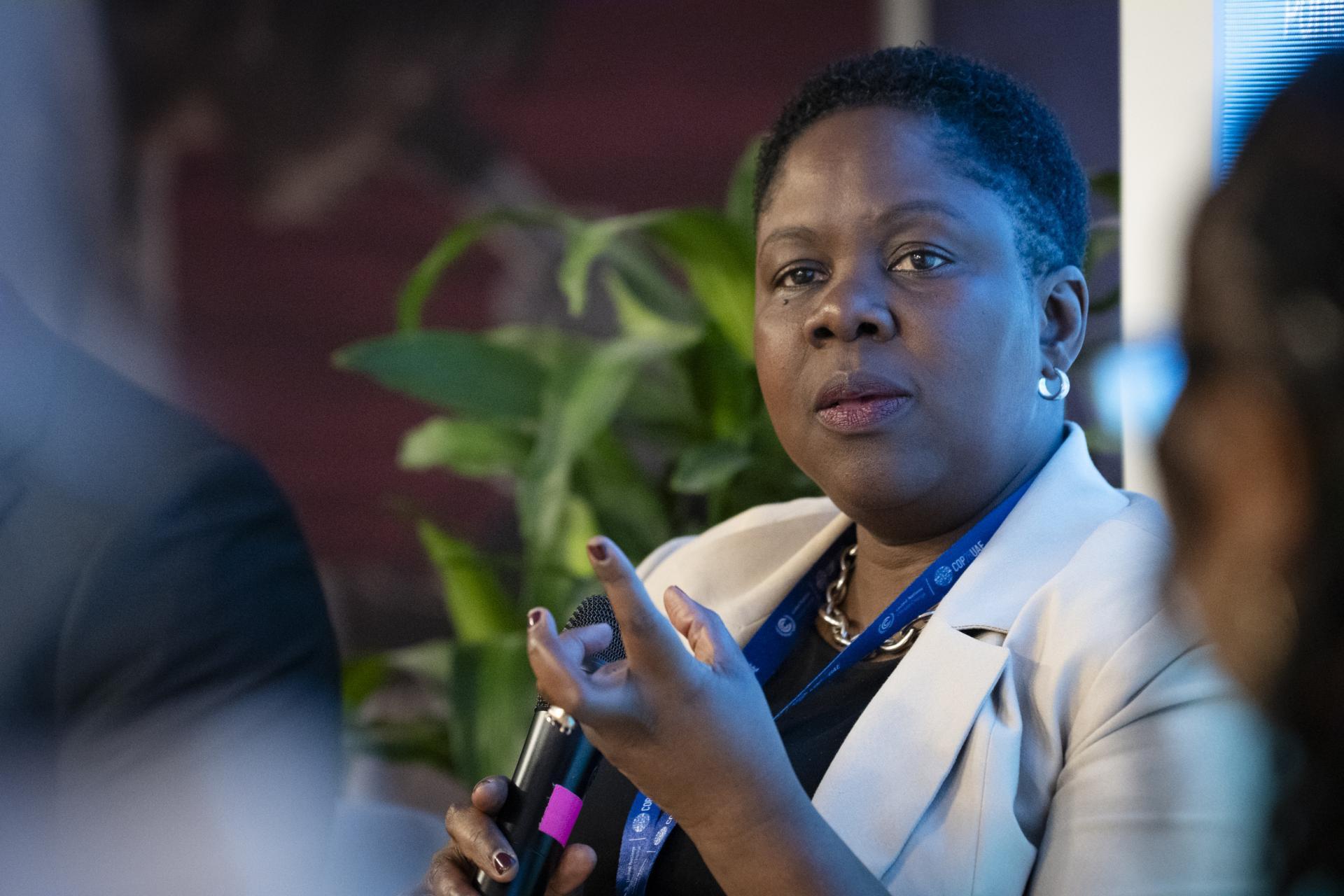
Edith Adera – Lead Coordinator of the Africa Adaptation Acceleration Program (AAAP) and Regional Principal Officer at The African Development Bank Group
CGIAR is responding and stepping up to the challenges outlined by the speakers. AICCRA welcomed Javier Mateo-Vega (Senior Director for Partnerships, Stewardship, Innovation and Intelligence at CGIAR) who said:
“CGIAR has demonstrated its capacity to be a good partner - that is inclusive, collaborative, and demand responsive.”
And he was transparent in acknowledging that there is still room for improvement in terms of how international organizations engage with partners, particularly when it comes to mandates for action and the sharing of resources.
Javier went on to outline to the audience how some of the transformative changes that are being implemented in CGIAR respond precisely to the demands and aspirations of African partners.
Firstly, CGIAR is undertaking its most in-depth, far-reaching reform in its fifty-year history, known as ‘OneCGIAR’. As part of this reform, a formal partnerships and advocacy function has been constituted, which focuses on strengthening and improving engagement with partners, including monitoring the overall health of CGIAR partnerships.
Secondly, at the highest levels of CGIAR, a new Engagement Framework has been adopted, sending a “very powerful and strong signal”, as Javier noted, to CGIAR staff and their partners that it’s committed to continuing to improve the way that we engage with all partnerships.
The framework outlines principles such as complementarity, shared ownership, accountability and transparency which were devised in collaboration with a high-level advisory panel appointed by the CGIAR board, which produced three high-level recommendations and 20 action points. As Javier concluded, CGIAR is “taking them onboard, in earnest”.
In relation to his vision for the future of CGIAR partnerships in Africa, Javier said he wanted to see a “triple bottom line” of high impact science, strengthened national scientific systems and most importantly “partnerships that are very healthy, happy and prosperous.”
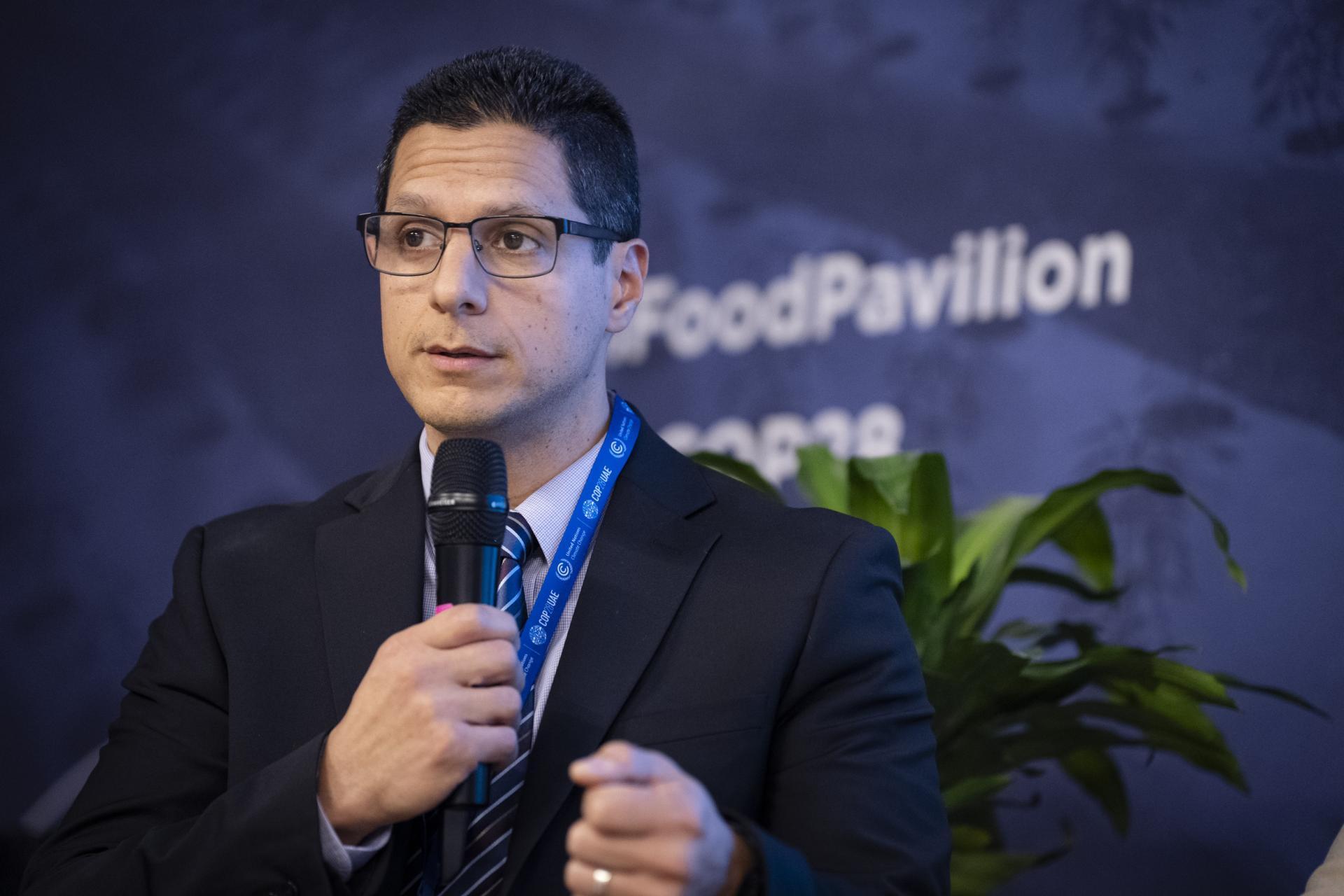
Javier Mateo-Vega – Senior Director for Partnerships, Stewardship, Innovation, and Intelligence at CGIAR
A fellow panelist, Cliff Dlamini (Executive Director at CCARDESA) emphasized that, “there’s no question the CG[IAR] over the past five decades has done a great job.”
And to strengthen the relationship, Cliff stressed that CGIAR should collaborate with organizations like CCARDESA through regional bodies like the Southern African Development Community (SADC), precisely because they have the political mandate for regional action that scales innovations.
As the AICCRA project looks set to continue its collaboration with African partners thanks to the additional finance announced by the World Bank, Cliff set out a compelling challenge that is relevant both to AICCRA, but also to broader CGIAR partnerships in Africa:
“We have to define what we mean by scaling. Because scaling can be ‘scaling up’ looking at numbers. It can mean ‘scaling out’, trying to change policies and institutions through innovation and technology. It can mean ‘scaling deep’ trying to change the narrative when it comes to cultures.”
He added that: “If you scale up and forget to scale out and scale deep you might not win.”
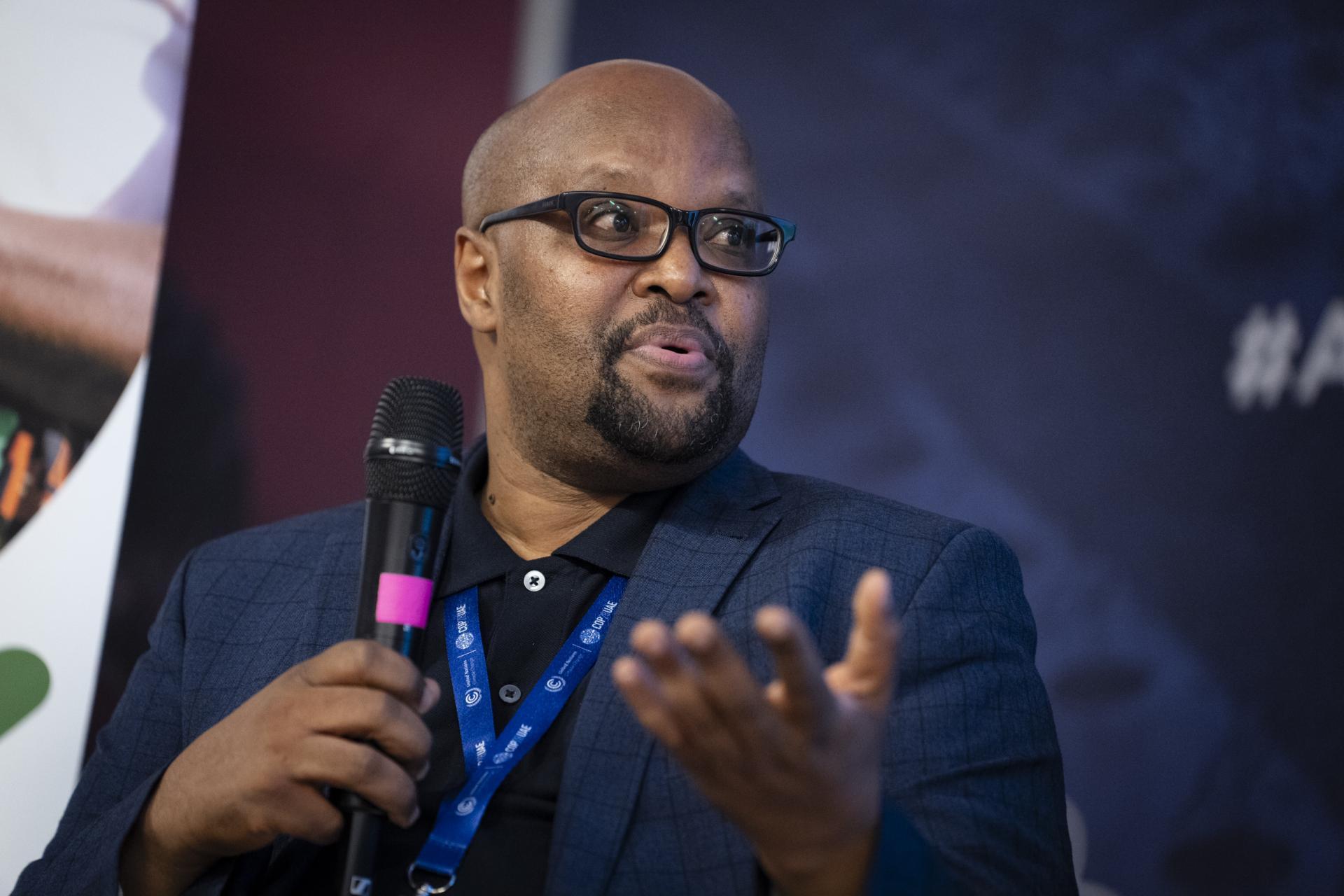
Cliff Dlamini – Executive Director at the Centre for Coordination of Agricultural Research and Development for Southern Africa (CCARDESA)
In closing the event, and setting the agenda for future ambitions, Phoebe Mwangangi reflected that she will, “go home a happy farmer, because the panelists demonstrated goodwill towards the farmer. It is the farmer who is the implementer. You may do your policies, you may do your research, but you will not implement them. It is the farmer.”
She added that, “I was worried that the partnership was not strong, but it has been strengthened. Thank you.”
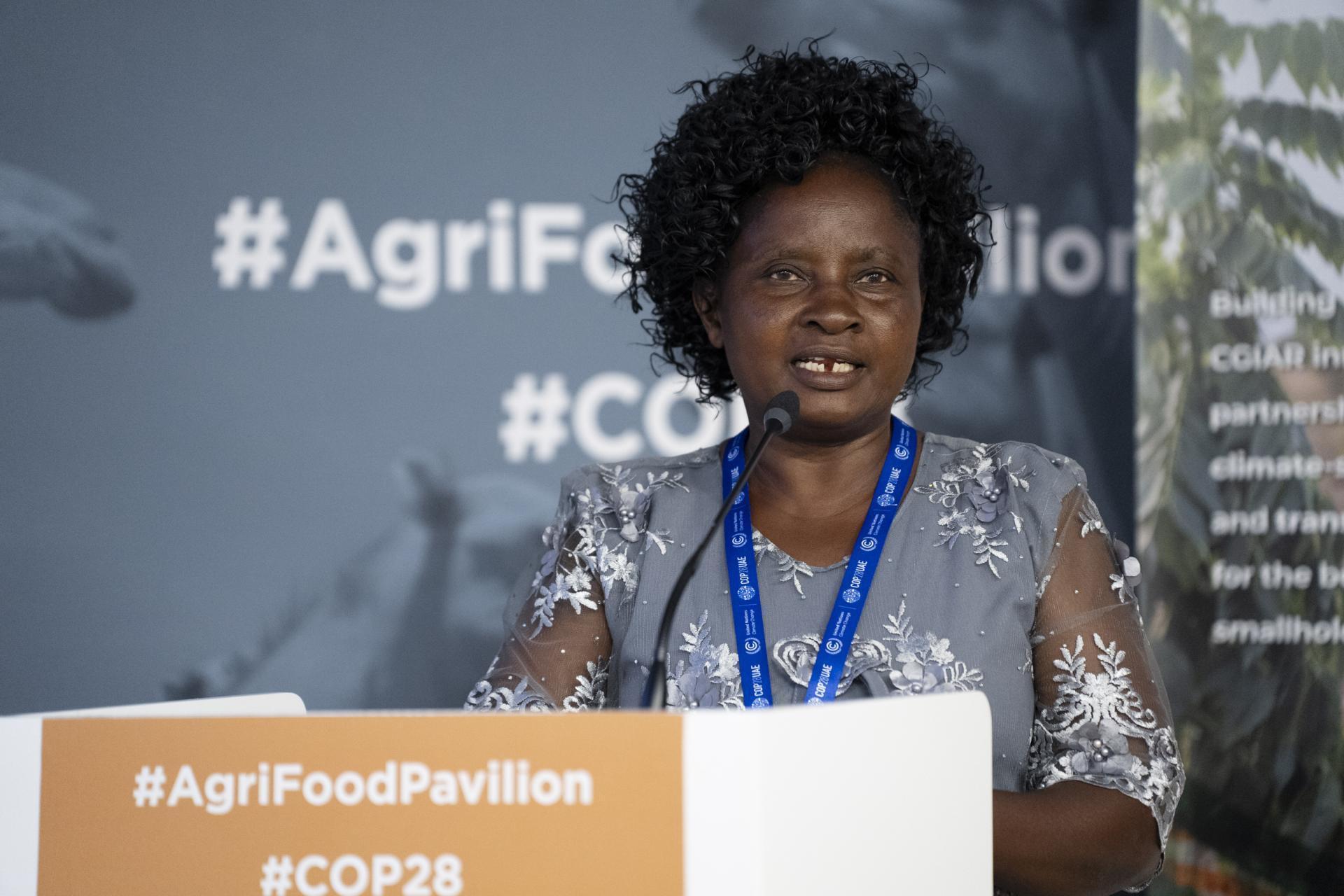
Phoebe Mwangangi – Smallholder farmer from Makueni County, Kenya
Authors
Ana Maria Loboguerrero, AICCRA Director, and CGIAR and Alliance Director for Climate Action
Rhys Bucknall-Williams, AICCRA Global Communications and Knowledge Manager
All images in this piece are courtesy of the Food & Agriculture Pavilion. Find out more at foodpavilion.org
